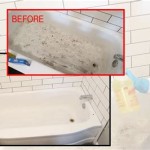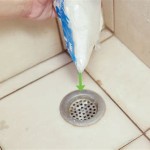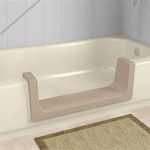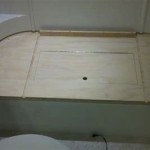Best Bathtub Mildew Cleaners: A Comprehensive Guide
Maintaining a clean and hygienic bathroom is crucial for overall health and well-being. Mildew, a type of fungus that thrives in damp environments, is a common problem in bathrooms, particularly around bathtubs and showers. Its presence not only looks unsightly but can also pose health risks, especially for individuals with allergies or respiratory sensitivities. Selecting the best bathtub mildew cleaner requires understanding the nature of mildew, the available cleaning options, and their respective strengths and weaknesses.
Mildew appears as a dark, often black or gray, stain or growth on surfaces. It propagates through airborne spores that readily colonize damp areas with poor ventilation. Bathrooms, with their high humidity levels and frequent water exposure, provide an ideal breeding ground for mildew. Regular cleaning and preventative measures are essential to control and eliminate mildew growth.
The market offers a variety of bathtub mildew cleaners, ranging from chemical-based formulations to natural alternatives. Each possesses different properties and effectiveness depending on the severity of the mildew infestation and the type of surface being cleaned. This article aims to provide a comprehensive overview of the best bathtub mildew cleaners available, examining their composition, application methods, and suitability for different bathroom environments.
Understanding the Cleaning Options
The selection of a mildew cleaner hinges on several factors, including the severity of the mildew, the type of surface affected (e.g., tile, grout, acrylic), and personal preferences regarding chemical exposure. Broadly, mildew cleaners can be categorized into several types:
Bleach-Based Cleaners: These cleaners are widely recognized for their potent disinfecting and stain-removing capabilities. Sodium hypochlorite, the active ingredient in bleach, effectively kills mildew spores and removes their unsightly stains. However, bleach-based cleaners can be harsh and require careful handling due to their corrosive nature. They can also release strong fumes that may irritate the respiratory system. When using bleach-based cleaners, adequate ventilation is critical, and protective gear such as gloves and eye protection is recommended. Bleach should never be mixed with ammonia or other acidic cleaners, as this can produce toxic gases.
Enzyme-Based Cleaners: These cleaners utilize enzymes to break down the organic matter that serves as food for mildew. They are generally considered safer and more environmentally friendly than bleach-based options. Enzyme cleaners work gradually, digesting the mildew over time. They are often preferred for porous surfaces like grout, where they can penetrate deeply to eliminate mildew at its roots. However, enzyme cleaners may take longer to produce noticeable results compared to bleach-based alternatives.
Hydrogen Peroxide Cleaners: Hydrogen peroxide is a mild oxidizing agent that can effectively kill mildew and lighten stains. It is a relatively safe and environmentally friendly option compared to bleach. Hydrogen peroxide decomposes into water and oxygen, leaving no harmful residue. It is particularly effective on light mildew stains and can be used on a variety of surfaces. However, for severe mildew infestations, hydrogen peroxide might require multiple applications or be less effective than stronger alternatives.
Vinegar-Based Cleaners: White vinegar, a common household ingredient, is a natural acid that can effectively kill mildew and prevent its growth. It is a non-toxic and affordable option suitable for routine cleaning and maintenance. Vinegar can be sprayed directly onto mildew-affected surfaces and allowed to sit for several minutes before scrubbing and rinsing. While vinegar is effective against mildew, its acidic nature may damage certain surfaces, such as natural stone. It is always advisable to test vinegar on an inconspicuous area before applying it to the entire surface.
Specialty Mold and Mildew Cleaners: Many commercially available mold and mildew cleaners contain a blend of ingredients designed to target mildew specifically. These cleaners often include surfactants to help lift mildew stains and biocides to kill mildew spores. They may also contain additives to prevent mildew from returning. When selecting a specialty cleaner, it is important to read the label carefully and follow the manufacturer's instructions. Some specialty cleaners may contain harsh chemicals, while others are formulated with more environmentally friendly ingredients.
Key Considerations for Choosing a Mildew Cleaner
Selecting the right mildew cleaner involves careful consideration of several factors to ensure both effectiveness and safety:
Surface Compatibility: Different surfaces react differently to various cleaning agents. Highly acidic cleaners, such as those containing hydrochloric acid, might damage sensitive surfaces, including natural stone (marble, granite), certain types of metal, and painted surfaces. Abrasive cleaners can scratch acrylic or fiberglass tubs. Always verify the cleaner's compatibility with the surface being treated, especially when using strong chemicals. Testing the cleaner in an inconspicuous area before applying it to the entire surface is a recommended practice.
Severity of Mildew Infestation: Mildew infestations can range from light surface stains to deep-seated growth within grout or porous materials. Mild infestations may respond well to gentler cleaning options like vinegar or hydrogen peroxide. However, severe infestations may necessitate the use of stronger cleaners, such as bleach-based or specialty mold and mildew removers. In cases of extensive mold or mildew growth spanning several square feet, professional mold remediation services may be necessary.
Ventilation: Adequate ventilation is paramount when using any type of mildew cleaner, especially those containing strong chemicals. Bleach and other harsh chemicals can release fumes that irritate the respiratory system. Open windows and doors, or use a bathroom exhaust fan, to ensure proper airflow. If ventilation is limited, consider wearing a respirator to protect your lungs.
Safety Precautions: Always wear protective gear, including gloves and eye protection, when handling mildew cleaners. This prevents skin irritation and eye damage. Avoid mixing different cleaning products, as this can create dangerous chemical reactions. Keep cleaners out of reach of children and pets. Store cleaners in a well-ventilated area, away from direct sunlight and heat.
Environmental Impact: Traditional mildew cleaners often contain harsh chemicals with potential environmental consequences. Consider using environmentally friendly alternatives, such as vinegar, hydrogen peroxide, or enzyme-based cleaners, to minimize your impact. Look for products that are labeled as biodegradable or non-toxic. Dispose of cleaning products properly, following local regulations.
Effective Application and Prevention Strategies
The effectiveness of a mildew cleaner is enhanced by proper application techniques and the implementation of preventative measures.
Preparation: Before applying any mildew cleaner, remove loose debris and surface dirt with a damp cloth or brush. This ensures that the cleaner can penetrate directly to the mildew stain. For heavily soiled areas, a preliminary scrub with a mild detergent may be beneficial.
Application: Apply the mildew cleaner according to the manufacturer's instructions. Spray or apply the cleaner evenly to the affected area. Allow the cleaner to dwell on the surface for the recommended time period, which may range from several minutes to several hours, depending on the product and the severity of the mildew infestation. For grout, use a grout brush to scrub the cleaner into the pores.
Scrubbing: After the dwell time, scrub the treated area with a brush or sponge to loosen the mildew stains. Use a stiff-bristled brush for textured surfaces and a non-abrasive sponge for smooth surfaces. Rinse the area thoroughly with clean water to remove all traces of the cleaner.
Drying: Thoroughly dry the cleaned area with a clean towel or cloth. This helps prevent mildew from returning. Consider using a dehumidifier to reduce humidity levels in the bathroom, particularly after showering or bathing.
Prevention: Preventing mildew growth is often more effective than treating existing infestations. Implement the following preventative measures:
Ventilation: Ensure adequate ventilation in the bathroom by opening windows or using an exhaust fan after showering or bathing. This helps remove excess moisture from the air.
Regular Cleaning: Clean the bathroom regularly, focusing on areas prone to mildew growth, such as the bathtub, shower, and grout. Use a mild detergent or a vinegar solution to wipe down surfaces after each use.
Sealing Grout: Seal grout lines with a grout sealer to prevent water from penetrating into the porous grout material. Re-seal grout lines periodically to maintain their effectiveness.
Shower Curtains and Doors: Regularly clean shower curtains and doors to remove soap scum and mildew. Consider using a shower curtain liner that is treated with mildew-resistant properties.
Leak Repair: Repair any leaks promptly to prevent water damage and mildew growth. Check faucets, showerheads, and pipes for leaks and address them immediately.
By understanding the nature of mildew, selecting the appropriate cleaning solution, applying it effectively, and implementing preventative measures, individuals can maintain a clean and healthy bathroom environment. Regular maintenance and prompt attention to any signs of mildew growth are essential for long-term control and prevention.

Zep 32 Oz Mold And Mildew Stain Remover Zumildew32 The Home Depot
Best Bathtub Cleaners

10 Best Shower Cleaners Of 2025 Reviewed

Oxiclean Bleach Mold Mildew Stain Remover

Professional Mold Mildew Stain Remover Spray 32oz

The Best Bathtub Cleaners For Your Cleaning Caddy Tested

Mold Mildew Stain Remover Spray 32oz

Mold And Mildew Remover Cleaner Miraclemist

13 Best Shower Cleaners Of 2024 Tested

Clr Pro Fm Mmsr32 6pro Mold Mildew Stain Remover 32 Oz 6 Case
Related Posts







